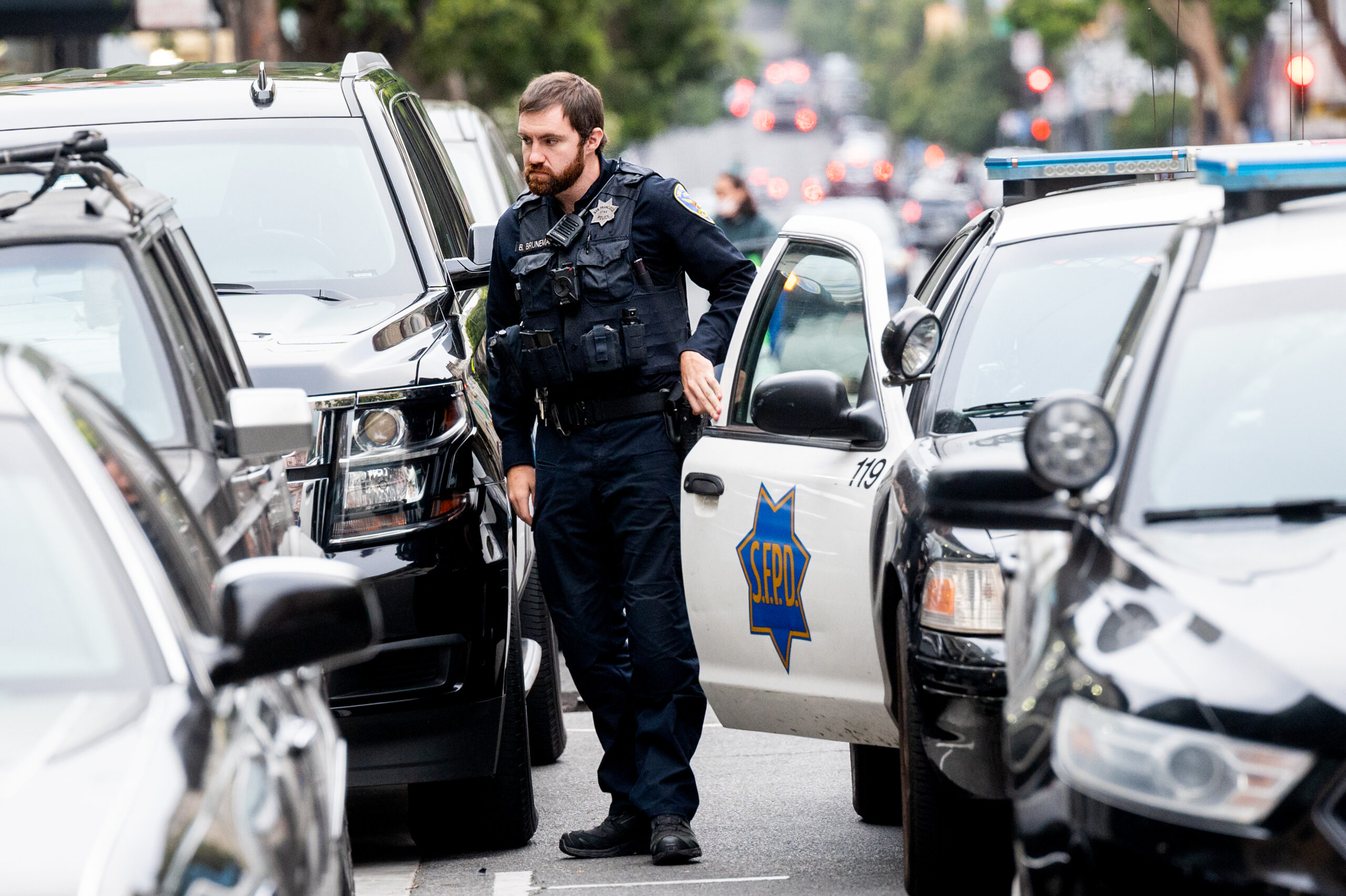As San Francisco tackles the stark racial disparities in its traffic enforcement, some police watchdogs are convinced that officers should be banned from making certain minor stops. But which ones to ban without endangering city streets is a matter of ongoing debate.
A newly revised proposal before the Police Commission would take offenses such as making an illegal U-turn and driving with a broken headlight off the list of banned traffic stops under review. That would shrink the list from 18 to nine types of stops that officers would be barred from making.
The proposal—from commissioners Cindy Elias, Max Carter-Oberstone and Kevin Benedicto—aims to balance safety and equity. Backers want to ban stops that drive racial disparities, but not at the expense of public safety.
The latest changes came after commissioners hosted what they called the watchdog body’s “most exhaustive public outreach effort” ever. The effort included a series of public meetings in recent months attended by officers, transit advocates and people impacted by the disparities.
Hearing stories in those meetings about how traffic stops affected people made Benedicto all the more certain that police policy must change.
“I’m more convinced than ever that inaction is not an option,” Benedicto said. “We have a responsibility to combat this problem, and the status quo is not acceptable.”
SFPD’s own data shows its officers are over five times more likely to stop a Black person for a traffic violation than a white person.
At the same time, police say traffic stops can help take guns and drugs off the streets. And even proponents want officers to keep stopping drivers for offenses that often lead to death or injury.
San Francisco would not be the first to ban traffic stops. Other places have taken a similar tack, including Virginia, Philadelphia and Pittsburgh, and banned them.
A hearing on the new plan takes place at Wednesday’s Police Commission, which will then bring it to a vote in the coming weeks.
That vote will likely test the strength of a powerful new bloc on the commission that could reshape the future of policing in San Francisco.
In backing the proposal, Carter-Oberstone appears to have split from Mayor London Breed, who appointed him to the position, and allied with commissioners installed by the Board of Supervisors.
While the Mayor’s Office denied it, Carter-Oberstone said in September that a top staffer for Breed urged him to slow things down by questioning the legitimacy of the outreach process.
A spokesperson for Breed had yet to read the latest proposal when asked for comment Friday.
The police union also declined to comment, but previously said traffic stops are effective for seizing contraband, and that a ban could send a dangerous message to criminals in San Francisco.
The initial intent of the ban was to prevent officers from making what’s known as a pretextual stop. That’s when an officer pulls over a driver for a minor offense, but actually wants to investigate an unrelated crime without enough evidence.
But translating that goal into reality has been complicated. So commissioners pushing for a policy change are adding some nuance and seeking to make certain minor violations off limits so cops can’t use them as pretext for something else.
Carter-Oberstone, who first pitched the ban in May, cited a couple main reasons to exempt some stops from the ban.
While illegal U-turns and unsafe lane changes were initially included in the proposed ban, Carter-Obertsone said he changed his mind because of transit data showing how often they end in cars crashing and people getting hurt.
Another consideration, he said, was data on the stops that tend to yield contraband.
Police stopping people for driving with tinted windows or broken headlights, for example, are more likely to find drugs.
“It’s critical that no infraction on the banned stop list has any public safety implications,” said Carter-Obertsone, the commission’s vice president. “We don’t want to put anything on the list that is a cause of traffic accidents or injuries [or leads to] arrests for serious crimes or discovery of contraband.”
He also expanded the proposed ban to include offenses covered by a new state law, Assembly Bill 2147, that bars police from stopping people for certain pedestrian and bicycle offenses.
Elias, the commission’s president, emphasized that the panel was diligent about gathering input from the community.
“The policy really is reflective of the feedback that we got,” she said.
Commissioner Jim Byrne, a Breed appointee, said he generally supports banning traffic-stops to curb racial disparities. But he’s concerned about disparities persisting in Virginia even after its police eased up on minor traffic offenses.
“San Francisco needs to do something to lower the racial disparities in police stops. I want to be clear about that. I think the entire commission is in agreement on that,” Byrne said. “The question is what will work and what will do the trick.”
